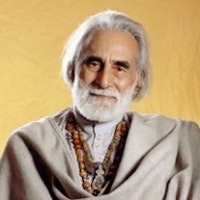Let your faith grow as you test and find what works for you, as you experience God in your life.
Pir Vilayat Inayat Khan

Let Your Faith Grow
Topic: Belief & Faith
Seek not for perfect belief, but let your faith grow as you test and find what works for you, as you experience God in your life.
Pir Vilayat Inayat Khan, born in 1916 in London, was the son of Hazrat Inayat Khan, a notable Sufi mystic who established the Sufi Order International. Raised in France, Pir Vilayat was immersed in both Eastern and Western cultures from a young age. He pursued his education at the prestigious Sorbonne University in Paris, studying psychology and philosophy, and furthered his studies at Oxford University. His artistic inclination led him to study musical composition and cello at the Ecole Normale de Musique in Paris, showcasing his diverse interests and talents.
After serving in the British Royal Navy during World War II, Pir Vilayat embarked on a spiritual quest, traveling extensively in India and the Middle East. His journey enriched his understanding of various religious traditions, culminating in his initiation into the Chishti Sufi Order of India. As a Pir, or spiritual teacher, he returned to the West in the 1950s, where he began disseminating a universal approach to spirituality. His teachings were grounded in meditation and inner exploration, drawing from the wisdom of various religious traditions to create an inclusive, globally relevant spiritual path.
Pir Vilayat’s contributions extended beyond spiritual teaching. A prolific author, he penned over 30 books on Sufism and spirituality, including notable works like "The Essence of Sufism" and "The Way of Illumination." His eloquence as a speaker and lecturer took him around the world, advocating for interfaith dialogue and the integration of diverse religious insights. His work in transpersonal psychology revealed his belief in the potential of psychology to aid in spiritual growth. Pir Vilayat's passing in 2004 marked the end of an era, but his legacy as a bridge between Eastern and Western spiritual traditions continues to inspire. His teachings offer timeless wisdom, guiding people towards inner peace and spiritual transformation, irrespective of their cultural or religious backgrounds.
Kahn, Pir Vilayat Inayat, et al. “Spirituality & Practice.” Spirituality and Practice, www.spiritualityandpractice.com/explorations/teachers/view/157/pir-vilayat-inayat-khan.

Pir Vilayat Inayat Khan
Resources
Copyright © 2017 – 2025 LuminaryQuotes.com About Us

Pir Vilayat Inayat Khan
Pir Vilayat Inayat Khan was born in London in 1916. His father, Hazrat Inayat Khan, left India in 1910, established the Sufi Order in London in 1916, and incorporated the Sufi Movement in Geneva in 1923. Pir Vilayat graduated from Sorbonne University in Paris in 1940 after completing studies in both psychology and philosophy. He pursued postgraduate studies at Oxford University as well as studying musical composition and cello at the Ecole Normale de Musique in Paris.
Hazrat Inayat Khan designated Pir Vilayat as his successor in 1926. After World War II, during which he served in the British Royal Navy, Pir Vilayat pursued his spiritual training by studying with many different religious traditions throughout India and the Middle East. He is an acknowledged Pir in the lineage of the Chishti Sufi Order of India. Through the Sufi Order International, Pir Vilayat offered a universal approach to spiritual development. During meditation retreats, lectures and seminars, he reflected upon the ancient stream of wisdom inherent in all religions and humanistic philosophies. He was active in the multifaith movement and was instrumental in bringing together leaders from different religions to explore their underlying unity and mutual interests.
—By Frederic and Mary Ann Brussat [Remembering Spiritual Masters Project – Spirituality and Practice website].
Additional Pir Vilayat Inayat Khan Quotes
“Conscious evolution is humankind’s final frontier, the ultimate freedom sought by humanity since the dawn of time. Thus the challenge seems to be one of overcoming the fear of the unexplored territory that lies ahead, and finding the courage and optimism to illuminate the spiritual dimension hidden within our nature. For it is the intuitive, radar-like quality of this transcendent faculty that will help to guide us through the darkness of the unknown — illuminating our minds and awakening our hearts to the splendor of a new consciousness.”
—Pir Vilayat Inayat Khan [Ours is a Way of Light].